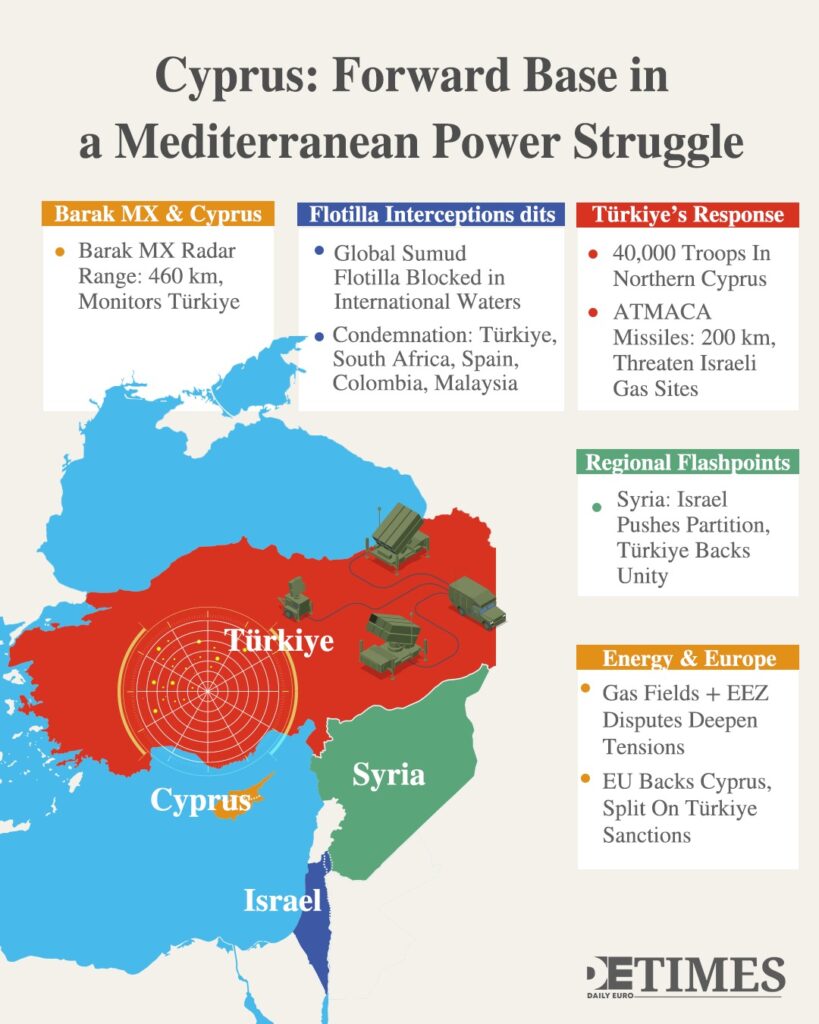Israel’s delivery of advanced Barak MX air defence systems to Cyprus serves a dual purpose: a entry point into EU waters whilst monitoring Turkish airspace from hundreds of kilometres away.
Türkiye’s response came with warnings about the destabilising impact this could have on Cyprus’s already divided status.
This development came just as Israel intercepted the Global Sumud Flotilla bound for Gaza, with naval forces boarding 39 vessels earlier in October.
Turkish Foreign Minister Hakan Fidan labeled this a terrorist act. These two events are linked both by geography and the struggle for regional influence.
Mediterranean Becomes Contested Space
Cyprus lies just 90 kilometres from Türkiye’s southern coast. Israel’s Barak MX system features radar that can detect targets up to 460 kilometres away, covering parts of Turkish territory extensively.
Since 1974, Türkiye has stationed 40,000 troops in northern Cyprus and has deployed anti-ship missiles with ranges of 200 kilometres, capable of reaching Israel’s offshore energy sites.
What was once a buffer zone now acts as a forward operating base, with each side positioning military assets to counter the other’s moves.
Syria Becomes Second Flashpoint
Israel and Türkiye are backing opposing visions for post-Assad Syria. Israeli Prime Minister Benjamin Netanyahu supports dividing Syria based on ethnic lines, while Türkiye collaborates with Damascus to keep Syria unified.
Israeli strikes targeted potential Turkish military sites in Homs and Hama provinces, coinciding with Ankara’s coordination with Syria’s new government over basing rights.
Defence Minister Israel Katz stated that Israel intends to hold Syrian territory indefinitely, a stance Türkiye views as a direct threat to its southern border security.
Flotilla Interception Adds Fuel
The Global Sumud Flotilla, carrying medical supplies, set sail from Barcelona, Genoa, and Tunis with parts of the convoy escorted by European navies from Spain and Italy.
Israel intercepted activists, including Swedish campaigner Greta Thunberg and Nelson Mandela's grandson, in international waters.
South African President Cyril Ramaphosa called the detained members abductees. Spain’s Prime Minister Pedro Sánchez defended the mission as humanitarian.
Turkish officials condemned Israel’s interception as illegal, demanding a regional response.
Colombia’s President Gustavo Petro threatened to expel Israeli diplomats, while Malaysia’s leader Anwar Ibrahim criticised Israel for detaining eight Malaysians.
Blue Homeland Doctrine
Türkiye’s Blue Homeland policy asserts control over its surrounding seas. Admiral Cem Gurdeniz, the doctrine’s founder, told Al Jazeera Israel’s presence in Cyprus effectively encircles Türkiye offensively.
Netanyahu openly confirmed his belief in the idea of a "Greater Israel" with a clear “absolutely.”
Turkish Foreign Minister Fidan described this vision as an attempt to keep regional states weak and divided. Already, Ankara halted trade with Israel in August, following Israeli media framing of Türkiye as the most dangerous regional threat.

Energy Fields Add Economic Dimension
Israel’s offshore gas infrastructure lies within the range of Turkish missiles. Ankara has deployed ATMACA anti-ship missiles specifically to target these sites.
Israel has proposed undersea defence systems to protect pipelines and platforms, highlighting how the Mediterranean’s gas reserves raise the stakes of territorial disputes.
The division of Cyprus between Greek and Turkish communities complicates energy harvesting, with both sides staking claims to exclusive economic zones. Israel’s alliance with Cyprus deepens its involvement in this dispute.
Qatar Strike Raises Stakes
Israel’s strikes in Qatar last September sparked speculation that Türkiye might be next. Qatar is a major non-NATO U.S. ally, yet there was no visible American response to the attack.
Michael Rubin from the American Enterprise Institute suggested Türkiye should not expect NATO protection. Israeli academic Meir Masri posted on social media, "Today Qatar, tomorrow Türkiye."
A senior Erdogan adviser responded with threats to erase Israel from the map, highlighting the rapid deterioration of diplomatic relations.
Europe’s Awkward Position
Countries bordering the Mediterranean are caught between NATO ally Türkiye and security partner Israel. Spain summoned Israel’s top diplomat over the flotilla interception.
Italy’s Premier Giorgia Meloni criticised the flotilla for undermining Trump’s Gaza proposals but still allowed naval escorts for activists.
Cyprus enjoys EU support for its territorial integrity, while Türkiye’s control of northern Cyprus has prompted EU sanctions. Now, Israeli arms sales to Cyprus complicate the EU’s united stance.
Proxy Conflict Takes Shape
Andreas Krieg of King’s College describes the situation as an indirect conflict, with grey-zone tactics including covert strikes, proxy battles, and air raids.
Omer Ozkizilcik from the Atlantic Council said Türkiye abandoned American security guarantees long ago and is pursuing its own defence build-up whilst Murat Yesiltas from the SETA think tank warned that U.S. and Israeli efforts to reshape the regional order risk fragmentation, with Türkiye insisting Syria cannot remain stable if divided.
The deployment of weapons to Cyprus highlights how the Mediterranean has become a stage for broader Middle Eastern rivalries.
Israel pushes power northward, Türkiye counters southward, and European states are caught navigating between two partners with conflicting goals.
Neither side benefits from open war; economic links and military risks restrain them. The flotilla incident and Cyprus deployment show how competition plays out through gradual moves rather than large battles, with each gain met by counteractions.
Keep up with Daily Euro Times for more updates!
Read also:
Cyprus Corridor: A Hub Between India and Europe
A Tug of War: One Island and Two Visions
Stalemate in Cyprus: Talks Yield No Breakthrough






